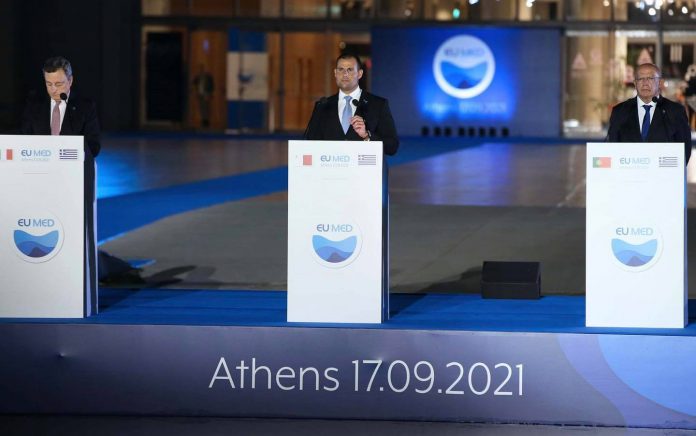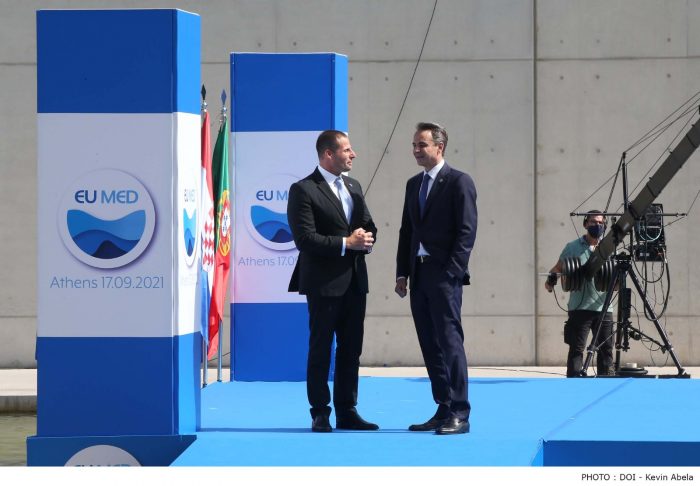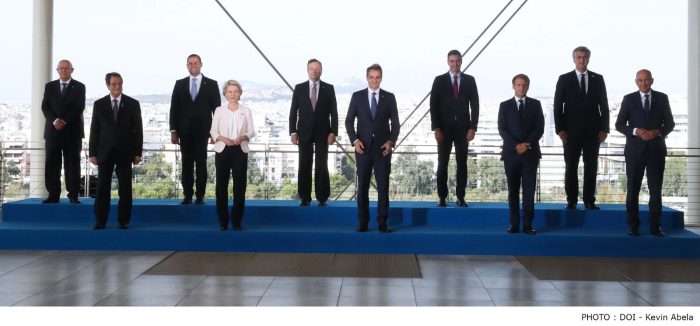Good evening, and thank you Prime Minister Mitsotakis for your welcome, and for
hosting today’s Summit.
I am particularly pleased that we started our discussion with the topics related to
Climate change. It is a subject that is, and should stay, at the very top of our agenda.
More so because the entire Mediterranean region is on its way to being identified
as a “climate change hotspot”, and what we are experiencing now is only the
beginning. On this note I would like to convey my deepest sympathies to our
Mediterranean counterparts and their citizens, who have lost their homes and loved
ones due to the devastating damages caused by wildfires.
The EU has been a prime mover in setting the example globally and we need to
continue showing leadership in the battle against climate change, especially if we
are to ensure a successful outcome at COP 26 in Glasgow.
As regards mitigation, a lot of work has been set in motion at an EU level with the
Fit for 55 Package setting us on the right course. Taking the necessary action is a
must.
Our discussion today on biodiversity, forests, the marine environment and blue
economy confirmed that ambitious action needs to be taken on a regional and global
level. Prioritising new and innovative renewable energy technologies will also
contribute to decarbonisation and geopolitical stability.
We also agreed that safeguarding the competitiveness of certain sectors that are
global in nature, such as shipping and aviation, remains a key priority for our region.
These industries must be safeguarded against the backdrop of maintaining a global
level playing field, whilst ensuring that the strategic role of combined transport and
connectivity are addressed, as they are highly impactful on island states such as
Malta and Cyprus. All throughout, however, we must ensure that societal impacts
are considered with great importance.
It is amply clear, therefore, that there must be regional cooperation with our
Mediterranean partners in order for climate change adaptation strategies and
mitigation measures to be effective.
Which is why peace, security and, above all, stability in the entire Mediterranean
region remain crucial, as they collectively impact the enhancement of cooperation
and exchanges at all levels. Sharing a common approach is key for the future of the
Mediterranean region, and Europe as a whole.
I would like to take this opportunity to express solidarity with Cyprus. We continue
to stress that respect for sovereign rights and support for International Law and
dialogue are the way forward.
However, mindful of the fact that Turkey is a key player in the region and a partner
of the EU on many levels, not least migration, we also need a parallel track that
reflects reality. In this regard, cooperation with Turkey is increasingly important,
particularly with the unravelling situation in Afghanistan.
Afghanistan is a multifaceted case with serious security and humanitarian concerns.
These may have severe implications on the emergence of possible strategic threats
such as a marked increase in irregular migratory flows, narcotic trafficking, terrorism
and human rights abuses.
The EU’s disengagement from the area is not an option. It is vital for the EU and its
Member States to work closely with neighbouring countries in the region to stabilise
Afghanistan. This will in turn also reduce the risk of increased migratory flows, an
area where we also should start thinking of co-ordination and common guidelines.
Malta’s contribution to this effort may be small and limited in certain aspects, but
our political will and commitment to the cause are strong and significant.
Malta is concerned with the continuing irregular flows arriving at the EU’s external
borders. The Central Mediterranean route continues to see the highest number of
crossings.
In the medium and long-term, prevention of irregular migratory flows and enhanced
returns are of utmost importance, and this can only be ensured through increased
cooperation with third countries.
For the Central Mediterranean Route, Libya and Tunisia are a priority. Over the last
year, I visited Libya and had various discussions – as recent as last week when the
Libyan Prime Minister visited Malta. This open channel of communication between
Malta and Libya brought to the fore the excellent diplomatic relations we have
established with this country over the past months, which is yielding great results.
I can assure you that Libya is cooperating, and therefore ensuring forthcoming
assistance to our closest neighbour should always remain a priority for the EU.
Malta has consistently promoted a European foreign policy approach recognising
that peace and security in the Mediterranean is fundamental for stability in Europe.
We welcome the priority being given to the region and reaffirm the strategic
importance of the Southern Neighbourhood.
Particularly in a globalised world, none of the shared challenges faced in the region
today can be tackled by any country alone, therefore cooperation in the
Mediterranean is key to finding mutually beneficial solutions to shared challenges,
and to convert these into opportunities for cooperation.
The COVID-19 pandemic has brought the challenges we face in the region to the fore
and our priority now is a sustainable post-COVID recovery, and an inclusive green
transition. A European approach was instrumental in tackling the pandemic. This is
certainly a different September than we had one year ago, and this is thanks to our
common action on vaccination and the Digital COVID Certificate. I want to thank
Prime Minister Mitsotakis for pitching the model of green passports as this was a
critical game changer.
And talking about game changers. The NextGenerationEU is not just a recovery plan,
it is a historic agreement indicative of European solidarity.
Rightly so, the green and digital transformations are at the core of Europe’s
economic recovery, and it is imperative that they are reflected in our own country
policies. From my country’s end, the green and digital transformations feature
prominently in Malta’s Recovery and Resilience Plan as we dedicated a higher
percentage of the funding to green and digital projects than was required.
The blueprints are there. It is now up to us and our collective political will, to get
these translated into partnerships and programmes that make a real difference to
people’s lives.
Thank you.












